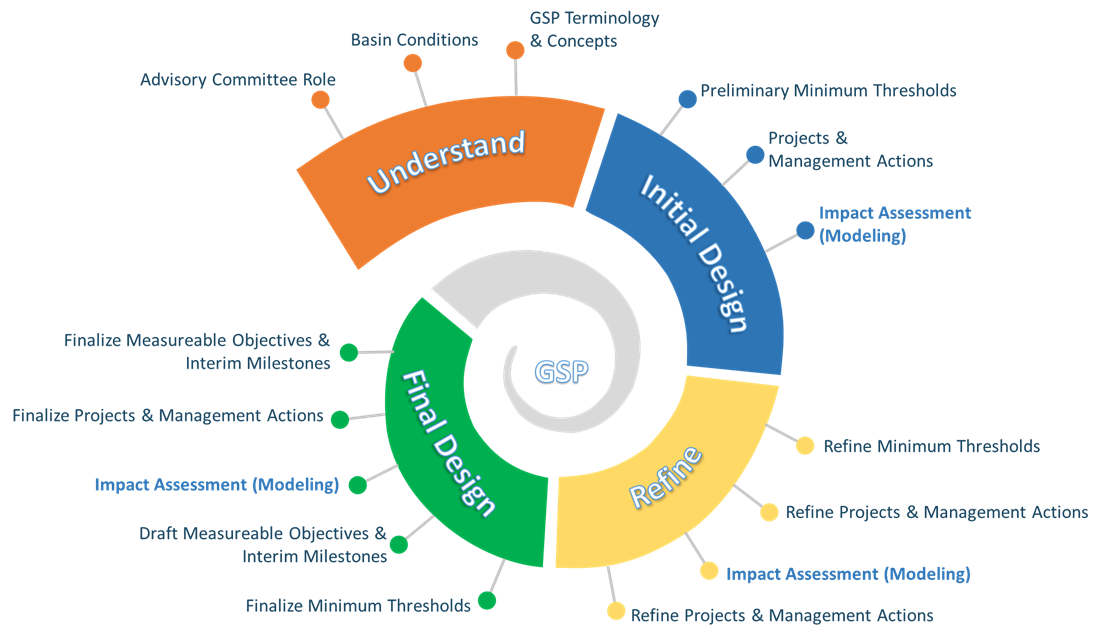California’s Sustainable Groundwater Management Act (SGMA) passed in 2014 requires high- and medium-priority basins to form Groundwater Sustainability Agencies (GSAs) and develop Groundwater Sustainability Plans (GSPs). The steps in the GSP development process, shown below, begin with establishing and defining the role of a local advisory committee.
Development of the Santa Cruz Mid-County Basin GSP relies on an appointed non-technical Advisory Committee to provide recommendations and consult with the GSA Board on what groundwater sustainability looks like for the Basin. This approach of actively engaging local stakeholders who provide diverse perspectives and are invested in the future of groundwater use in the basin encourages policy-making from the ground up.
However, one major challenge of this approach is that members with limited technical knowledge of groundwater provide recommendations on groundwater use and management. To address this challenge, M&A partnered with a facilitation consultant to educate and guide the Advisory Committee. This approach revealed several strategies for success that can be applied to similar planning processes.
- Define Roles
It is essential to collaboratively develop a charter that clarifies the roles and responsibilities of the Advisory Committee and the technical and facilitation teams. A professional facilitator will allow the technical team to effectively focus on the technical aspects of GSP development.
- Provide Education
While initial education at the beginning of the GSP process is vital, the technical and facilitation teams should provide multiple learning opportunities throughout the planning process. Advisory Committee members should only be asked for input on topics for which they have been sufficiently informed.
- Frequent Communication
Check-in calls with individual Advisory Committee members between meetings can provide early warnings of misunderstandings or unmet expectations. If necessary, separate working groups can be established outside Advisory Committee meetings to focus on specific topics that need more detail than is possible at regular Advisory Committee meetings.
- Provide Context
The role of the technical and facilitation teams is to guide the Advisory Committee. One way to effectively do this is to provide a range of acceptable sustainability options and explain how changes to an option could impact other components of the plan. Furthermore, the technical and facilitation teams should communicate to Advisory Committee members that the planning process is iterative and that there are no correct answers or decisions. To emphasize this, the Advisory Committee should regularly be reminded of the long-term GSP process. This can be accomplished by beginning every meeting with a timeline showing where they are in the process, what has already been achieved, and what still needs to be done.
Though it can be a time-consuming process that requires significant forward planning and investment, following these key strategies to effectively engage stakeholders can result in a better plan that is efficiently completed. Through this process, M&A has helped transform the Santa Cruz Mid-County GSP Advisory Committee into an informed, cohesive group that is working collaboratively with basin groundwater managers and contributing meaningfully to the development of their basin GSP.
About the Author
Georgina King, P.G., C.Hg., leads the technical consulting team for the Santa Cruz Mid-County Basin GSP providing technical expertise in hydrogeology and groundwater management. At the American Water Works Association (AWWA) Sustainable Water Management Conference in Tucson in April 2019, she gave a presentation on how to successfully engage the local non-technical advisory committees throughout the development of a GSP. Contact Georgina in M&A’s Oakland office.











